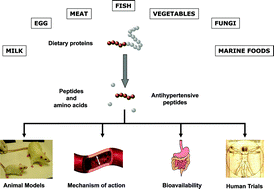 High blood pressure, known as the ‘silent killer’ is a significant health problem worldwide contributing to an increased risk for heart attack or stroke. There are numerous preventative and therapeutic drug treatments as well as dietary compounds that have been identified as contributing to cardiovascular health.
High blood pressure, known as the ‘silent killer’ is a significant health problem worldwide contributing to an increased risk for heart attack or stroke. There are numerous preventative and therapeutic drug treatments as well as dietary compounds that have been identified as contributing to cardiovascular health.
Food-protein derived peptides which have antihypertensive properties have recently received special attention; however, most of their properties have been demonstrated in vitro. To be confident of the potential these peptides have in cardiovascular health the beneficial effects must be demonstrated in vivo and in clinical trials.
This review from Blanca Hernández-Ledesma and co-workers from the Institute of Food Science Research in Madrid, Spain, looks at the current state of the data on blood pressure-lowering activity of food-derived peptides demonstrated in vivo through animal models and humans. Other key roles of these peptides such as the mechanism of action and bioavailability are also summarised.
Interested in knowing more? Read the full article for free until 21st February:
Antihypertensive peptides from food proteins: a review
Daniel Martínez-Maqueda, Beatriz Miralles, Isidra Recio and Blanca Hernández-Ledesma
Food Funct., 2012, Advance Article, DOI: 10.1039/C2FO10192K
You may also be interested in this review on the role of milk pepetides in cardiovascular health which is freely available:
The potential role of milk-derived peptides in cardiovascular disease
Martha Phelan and David Kerins
Food Funct., 2011, 2, 153-167, DOI: 10.1039/C1FO10017C










